#i made a conscious decision to hate these things and i exaggerated my inherent more boyish? qualities in order to make it
Explore tagged Tumblr posts
Text
publicly thanking lisa cuddy for telling me i can nurture traditional female qualities and be a doctor and doing this won't make me lesser of either role
#jo in the tardis*#i think she is the main reason why i let myself look the way i've always wanted to look today#i used to be obsessed with make-up and dresses and skirts as a little girl and then#i made a conscious decision to hate these things and i exaggerated my inherent more boyish? qualities in order to make it#but now there is a perfect balance...#because none of these qualities are gendered independently it's how they're perceived universally that sucks#that quote that's like i am not stuck in my body i am stuck in other people's perception of it#i really LOVE being a girl. and i don't feel bad about it anymore#i just feel like meeeeee... i can look like bob dylan AND lisa cuddy and it's cool.
5 notes
·
View notes
Note
So I've been following your tumblr for a while now, and I've seen everything you've had to say about the crossover. I should preface this by saying that I am white with no Jewish ancestry. So I suppose my place isn't the question, because this does not affect me directly. However: I do not understand how showing Nazis as villains is a bad thing. I am not questioning that it hurts people. I've seen that it clearly does. What I question is "Why?" I don't grasp why Nazi=villains is a bad thing.
I’m going to be bluntly honest here. I had to mentally dismiss about ten blithe responses to this that were on the order of that now-infamous tweet “I don’t know how to explain to you that you should care about other people.” I know that’s not what you’re saying, but I struggled, when I read this, to grasp how you could say that you see the harm (hurt) it is causing and yet don’t see that it’s wrong.
And how it could be true that you’ve actually read this post, and this one, and this one, and this one, and this one, and this one, and some of the other stuff I’ve put in my tag for the crossover, and yet still be confused about this. And one of those posts, mind you, explicitly explains why it’s more than just “they made Nazis the villains of the crossover”.
And part of why I was tempted to answer blithely is because, given all that, I think it’s been explained time and again what the issue is here, and how it goes so far beyond the fact that them making Nazis the villains is the problem. The other part is because to re-explain it, to break it down to its elemental components? That takes time - hours from the time I started thinking about this to the time I’ll be done writing it - and energy - in terms of research and resources. I’m doing a lot of labour for you, emotionally and physically here. And part of me wants to shirk that labour, to put it on you to do it.
But… I can’t. Because I can answer your question, at least from my own perspective, and it is an important one to answer. Because before I understood just how much my own privilege impacted how I see the world and started to actively push back against it and expand my perception, I probably wouldn’t have fully understood either.
So I can’t explain this as eloquently or succinctly as some other people. And I can’t explain this from the perspective of someone who’s directly being harmed by this crossover (because I am also white and a gentile). And I’m sure many people people who are direct targets of Nazis would tell you that “isn’t it enough that it is harming me?” and they would be right, full stop. That would be an acceptable answer.
But I’m going to do my best to give you the understanding I genuinely think you’re looking for, allowing for the fact that others may have more to add or clarify, and allowing for the fact that my answer is inherently limited by my privilege.
I trust that you’ll read to the end, even though it’s long. And if at the end you still can’t understand, or you think I’m exaggerating, then I urge you to think on this, to sleep on it, and to read more and more about it. And even without understanding, to respect the voices of the Jewish (and gay, and Rroma) people who’ve spoken out about these problems time and again when things like this crop up. Amplify those voices, even if you can’t see the long-term ramifications of why this is ‘Bad’ yet.
First, the issue here cannot be reduced to “Nazis are the villains of the crossover.” Because that [.] at the end is actually a […]. It really goes like this: Nazis are the villains of the crossover…
… and the premise is based on the notion that Nazis won and have world domination.
… and that premise implies that Nazis are so powerful that with a bit of ‘bad luck’ in history, Nazis could have won.
… and that premise contributes to the mythic aggrandizing of Nazism that makes so many people Nazi sympathizers or apologists.
… and many heroes doppelgangers are Nazis.
… and Jewish-coded heroes’ doppels are Nazis.
… and a Jewish-coded hero who came to earth at age 12 and was raised on better principles than that still became a Nazi.
… and that notion spits on the original intent of the Jewish creators of these characters.
… and all of this implies that “good and heroic” people can still turn out to be Nazis, undermining the very message heroes should send. (Being a hero only when it’s easy is not being a hero at all. Doing the right thing when it’s against what society enforces is what makes them heroes.)
… and this turns the heroes that people (including Jewish people) look up to for hope and comfort into symbols of hatred and genocide.
… and the Nazis interrupt an interracial marriage between a Black woman and a Jewish-coded hero (who is canonically Jewish in parallel media like the DCEU) for the sake of drama.
… and the Nazi doppelganger outfits are designed to look ~*sexy*~ to an uncritical viewer.
… and the ~*sexy*~ doppel outfits include genuine Nazi symbols from WW2, which are pretty damn triggering to a lot of people. (But yet no sign of a swastika because that would most likely turn those uncritical viewers too far off).
… and they’re ~*sexy*~ enough that people already want to cosplay that Nazi and buy merchandise of that Nazi paraphernalia.
… and the promo photos show that a Jewish woman and a Black woman are going to be targeted specifically, thus capitalizing directly off threats and violence to actual historical victims of the Nazis.
… and the promo photos treat Wellsobard (many people’s fave villain) as an allusion to Dr. Mengele, one of the most infamously disgusting and reprehensible people to ever exist.
… and the promos show us images of a gay character and actor wearing a ‘Pink Triangle’ once again being used as a symbol of hate and shame.
… and there is a good chance that a Jewish character (Martin) is going to get killed off during this crossover.
…and the storyline is likely focused on the love story between a white gentile and a Jewish woman who gets targeted by his evil Nazi doppelganger.
… and the shows already have a history of antisemitism by putting a Jewish woman in a gas chamber (wtf Arrow), killing a Jewish one-off villain with radiation in a compressed chamber (Atom Smasher, wtf The Flash), erasing the Jewish identity of some characters (e.g., Ray Palmer) and failing to mention another’s (Martin’s) in three seasons (c’mon Legends), and no-doubt more.
… and … this list goes on. It really does. This is not exhaustive.
And you might be tempted to think “but if the Nazis are defeated, and shown unequivocally to be the bad guys, then isn’t it okay? Isn’t it historically accurate that the Nazis would target the Jewish and Black and LGBTQ characters and wear Nazi symbols anyway? Many of the main producers are Jewish or gay, they’re not trying to say anything good about Nazis.”
So this is where we have to talk about narrative framing, implicit associations, and sociological implications.
The concept of framing in psychology deals with how we can present the exact same information in different ways and get vastly different responses. How we present information, even paired down to simple basic statistics, massively impacts how people internalize and encode that information and therefore how they respond to it.
In narrative, we know that how we frame a character’s motives and background influence how they’ll be perceived by the audience. So many heroes in action movies kill and murder their way through a scene, but their crimes are justified by the narrative frame, whereas the villain’s won’t be. Or in order to humanize villains and make them sympathetic, the narrative may shift the viewer’s paradigm by re-framing the information: yes this villain is an asshole who hurt your favourite character, but they’re doing it because of [x].
So when we look at the crossover, we have to interrogate how it’s being framed. Are the Nazis villains? Yes? Good, check. … But the Nazis are also doppelgangers of our beloved heroes?… Okay, right off the bat, that’s bad.
That will make some people inherently sympathize with the Nazis doppels and like them. We have an emotional and automatic response to these faces, to these people, that is going to work faster and parallel to how our conscious brain responds to them, and many viewers (those who don’t have an automatic and massively negative knee-jerk response to the premise or the symbolism already built in) will have to be consciously and continuously inhibiting any decision to feel some positive sense toward those characters, and many viewers aren’t going to put in that conscious effort, especially not while the narrative is so distracting.
(For the record, if you consciously create this negative association it’ll become automatic. We aren’t born hating Nazi symbolism, we encode associations to it, and if you continuously encode negative ones, then you’ll hate other things associated with that symbolism too!)
So now in the crossover, by how our brain creates associations, if we have a positive association with that hero, there is an association now between that hero and their doppelganger, and that doppel and Nazi symbolism. That creates a link between positive feelings and Nazi symbolism. Say what? Look, our brains are simple in their associations and categorizations. There’s ways around this, but if we leave these associations unchecked, this can happen. Especially for viewers who won’t recognize and understand the symbolism like the ‘SS’ on Overgirl’s chest (i.e., younger viewers who are most impressionable and who the education system has seriously failed, and privileged viewers who weren’t taught to have strong negative associations to these less well known Nazi symbols).
And we already know this is happening. This is literally why we have articles on popular press outlets saying they want to buy merch of Overgirl (Supergirl’s Nazi doppel)’s outfit, which is literally emblazoned across the chest with Nazi symbols. People are saying they want to buy actual Nazi merch and the crossover hasn’t even aired yet. Just… let that sink in for a sec?
So.
That’s one reason why making heroes as Nazis is bad, and why making Nazis sexy is bad. Because of the automatic associations our brains make with those beloved characters, and even with attraction. If we find something attractive or beautiful, we tend to have automatic associations with that as ‘good’. Beautiful = moral is one of the stronger associations we have and it’s reinforced by media time and again. (Conversely to ugly = evil, or evil = queer. And female villains are often designed for sex appeal but it’s misogynistic anyway because it deals with a lot of bullshit about feminine purity and evil seductresses, and still conflates these associations our brains are going to make).
And look, it’s 2017. We have Richard Spencer the literal Neo Nazi on TV and articles about how this ‘alt-right’ leader is sexy and cool. We don’t need DCTV to jump on the bandwagon of making Nazis seem “cool”. Human beings experience approach motivations toward things we find attractive. The only option is to experience disgust and anger in response to people like Spencer and characters like Overgirl, or else we may fall prey to the implicit associations put forth by the media itself.
And that’s the problem: the media (the DCTV shows) are putting these associations there and forcing the viewers to work against them if we want to watch this and not come out of it as worse people for it. It’s designed to be entertaining and thrilling and they spent millions of dollars making it that way, and so much of that budget went to making the villains what they are.
So it’s not enough for them to say that Nazis are the villains or even to show them getting their asses kicked if they set the Nazis up to start as all-powerful world dominators. It’s not enough to have these characters say “I hate Nazis” when they show their doppels as Nazis and capable of those atrocities.
And if you’re starting to think “there’s an important message here. About how Nazis can look classically attractive but we shouldn’t be taken in by that, and about nature versus nurture and how we need to actively push back against evil within ourselves or else, in another dimension or if things had gone different, even we could be evil.”
That’s… tempting to argue. It’s an important message, to be sure. But given the stylized outfits and triggering imagery and the way they’ve set up the narrative, I don’t anticipate that’s the message we’re getting here. I mean, I think it’ll come up, most definitely, but I don’t think it’s what the viewer is ultimately going to take away from this. Not in the “I need to look within myself and push back against my own biases” sort of way. That’s not the way they’ve framed this.
And for a comparison point, if you want a narrative that says “White supremacists are all evil, don’t get taken in by one who seems ~reasonable~ and looks normal, and see what these modes of thought actually look like” then watch the movie Imperium (2016) and see how they handle it. (And then compare that to American History X, which apparently some Neo Nazis like, even though it’s inherently anti-Nazi, because it paints them as being powerful and is full of the visual symbolism they uphold).
Because the way they’re currently framing the CW crossover, it’s really just about amping up the drama? And they’ve capitalizing on intergenerational trauma of the Jewish community and the collective trauma of the Holocaust to the gay community. And I’ve said elsewhere that I have no doubt the intent was good, but good intentions aren’t enough.
If the producers don’t understand the damage they can cause by making ~*sexy*~ Nazis literally capable of world-domination (they’re not, they never were, they were superstitious and put genocide and hate over actual scientific advancements and their disgusting experiments on humans didn’t teach us near as much as people pretend they did), and re-writing heroes as Nazis (which, if anyone recalls, created a huge outcry when Marvel wrote Captain America as a Nazi) then regardless of their intent, they need to rethink their storytelling. Or if they really think that the right way to make a statement about the rise of Neo Nazism in the wake of the Trump election is to put the ‘SS’ symbol on Supergirl’s chest and make Eobard into Dr. Mengele, to recycle imagery of actual Nazis from WW2 and put a pink triangle on a gay man’s chest in 2017…. they don’t get it. Whatever their intent and regardless of where they’re coming from, they don’t fucking get it.
Sorry, I’m getting worked up. My point is that if they wanted to make a statement about things today, there were a million better ways to do it, and I could list at least 5 off the top of my head right now. But those would be more controversial, harder to pitch and sell, and not as stylized or easy to promote. So stylish Nazis is what we got. And that’s just… such a problem, including literally the ‘stylish’ part of that sentence.
Nazism and white supremacy are inherently performative. Nazis were all about the #aesthetic. They aligned themselves with famous designers for their uniforms. They had the villainous dramatic flair, and they used it to their advantage. Having that in the crossover might be historically accurate, but it falls right into what the Nazis themselves do: make themselves look good to amp up this notion that they are good.
And a problem with depicting them this way (instead of making them pathetic, vacuous, hate-filled to the point of self-defeat, self-important to the point of being ultimately silly and sad, punching down their notions of grandeur) is that actual Nazis like it. They like being portrayed as sexy, powerful, and cool. And depictions like that help them with their recruiting. “Look, isn’t Overgirl sexy? She’s like our mascot. They know that when we take back this country from foreigner invaders, this is how it’s gonna look.” Because they say when, not if, and they recruit by framing themselves as the victim in a struggle against invaders and usurpers. Make no mistake, white supremacy is a victim complex of untold proportions and having attractive, fan-favorited characters championing their cause helps spread their message.
But let’s get back to the crossover’s broader sociological message and stop talking about actual modern-day Nazis for a sec.
Nazis have been the villains in DCTV before. On Legends in 1942, and with Damien Darhk (again, actual literal Nazi, and again, the narrative has made him “entertaining” in the eyes of some viewers and keeps bringing him back over and over as a villain?). Nazis have also been the villain in pop culture for half a century. Indiana Jones. Star Wars comes to mind in particular. They’re not shy about the fact that their villains are explicitly based on Nazis and the Nazi regime. Which is working out so well considering how many people are mooning over Kylo Ren when he’s a genocidal fascist who murdered his own father (”but it’s okay because he’s just misunderstood, and by that I mean I find the actor attractive and I, too, have anger and angst so I identify with him, this Nazi”). At least in Star Wars it’s figurative, I guess?
And the thing about these narratives, the problem with these narratives, is that they fictionalize Nazis. This isn’t necessarily a reason to vehemently boycott these media or rail against them, but just, as a general phenomenon that’s happened over time, many people - and by this I mostly mean privileged people and people who don’t feel particularly targeted by Nazism - tend to think of Nazis as this cinematic enemy. This prop, this simple narrative device. This way of commenting on the past more than the present, or alluding to something about the present as a mere metaphor, and that metaphor tends to go over the heads of half the viewers anyway because most people aren’t taught to critically evaluate media except in high school english classes that no one takes seriously.
And fictionalized Nazis don’t look like real Nazis in the 21st century. So when real Nazis do gather, many people don’t realize just how bad that is, just how violent their coming together is going to be, and just why need to fight back against such demonstrations and against letting Nazis have any space or voice in our society. It’s like that “this is fine” dog cartoon where he doesn’t see an issue until the house burns around him? Making Nazis into a fictional narrative device can make it harder for many people to actually see the flames burning around them, because they’ve been taught that “real” fires look different than the ones already starting to burn their house down.
Finally, I’ll just come back to point number 1: this is hurting people. In a way that going to 1942 and letting Mick Rory roast Nazis didn’t. And as privileged individuals, we have a responsibility to call out and call attention to the issues in this media and to amplify others’ voices. But as human beings more generally? We also owe a duty of compassion to others.
Sure, there are a lot of people who aren’t hurt by this, but there are a lot who are. Who are shaking and sick to their stomachs and afraid for what’s happening in 2017 and how the tides of the world are turning. Who worry that this crossover is just another example of how casual people are about Nazism and who worry about everything I’ve listed here in detail as the broader effects of media like this and its current framing, even if they don’t have the language to articulate it all in one place like this. People who feel these effects, and feel the target on their back.
We owe those people some compassion, yeah? So when they say it hurts, we don’t need to say: why? That can come later. Our first question should instead be: how can I help?
#earth x#crisis on earth x#the crossover clusterfuck#replies#Anonymous#antisemtism tw#nazism tw#neo nazism tw#long post#long post for ts#phyn rambles#phyn rants#negativity#fandom wank#anti dctv#if i've said anything wrong or out of my lane then please amend as needed#though i really want to stop answering asks about this if i can because#i've said all i can say#repeatedly#you got close to 4 hours of my day#i have a tag on here for this crossover#and on my main you can search 'antisemitism' and learn more about these broader social trends#and if you're tempted to tell me that i'm overthinking then just... don't#i'm not#i'm just thinking critically#feel free to signal boost#this applies to more than just dctv#there's probably typos i'm beyond caring
71 notes
·
View notes
Text
SUPERNATURAL THE ANIMATION: A Dissection of Dean’s Failed Characterization & Design (PART 1 - The Technicals)
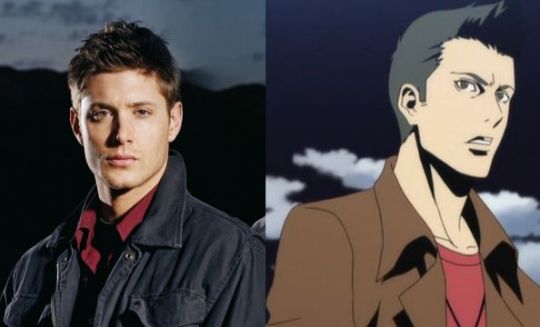
I have a lot on my chest about the anime that I couldn’t really get into in both of my last posts since the topic of what makes the anime series so cringe-worthy is a very intricate one, making the explanation of it all become a SERIES OF ESSAYS. So please read my previous installments before getting into this one because I will be referencing those a lot:
SUPERNATURAL THE ANIMATION: A THESIS OVERVIEW ON JAPANESE ANIME PRODUCTION & CHARACTER DESIGN
SUPERNATURAL THE ANIMATION: THE IMPORTANCE COLOR DESIGN BRINGS TO VISUAL TONE
But anyway, let’s talk about Dean. I’m gonna talk about Dean.
I will talk about Dean because Sam was portrayed pretty okay in the anime and it’s really Dean’s characterization that strikes a chord with a lot of fans of the original Supernatural series. (However I will consider a separate Sam essay to those in favor of it.)
But I haven’t really seen a lot of people put into words about makes them feel the way they do. So what’s the problem with Dean?
Refresher:
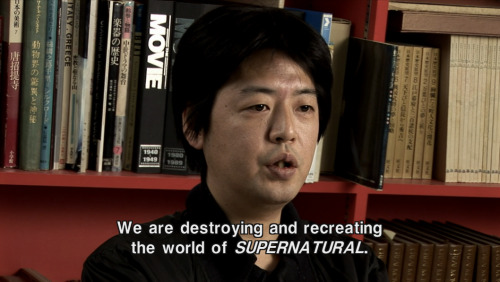
While I understand this distinction, I think that we can all agree that the overall interpretation of Dean suck balls and I’d like to argue that:
rather than misinterpreting Dean’s character, the writers were more focused on one of Dean’s major facades and ran with it.
But I’m getting ahead of myself.
First, I’d like to address the elephant in the room: Why an anime series?
Why did Supernatural garner enough attention to GET an anime series? What is so special about Supernatural AND anime that a large group of creatives and investors were willing to marry the two?
Honestly, that question is big enough for another essay on it’s own. But the bottom line is:
Anime is watched for the melodrama.
Nuance and subtitles are more akin to live action film since the culture around the different intricacies of a story have larger factors that contribute to it. (i.e, it doesn’t matter what’s written because an actor may just ad-lib it, Murphey’s Law, etc.)
So basically, when you have an animated show what you see is what you get by convention. There really is no use arguing over what is canon and what is not because, unlike an actor, decisions and change of mind can’t be attributed in the moment when it comes to character performance. People are more likely to question the mindset of a decision behind a scene when it’s animated more often than leaving it to the death of the author.
But it’s because of this that anime often has namely traits of exaggeration: screaming characters crying about their passion in the heat of battle, long ass internal monologues, “-dere” archetypes, the works.
Which means that anime characters are usually walking talking hyperbolic symbols. (Whether or not you enjoy this is usually the deciding factor between anime fans and those who are not.)
And this ties directly into Dean.
Because Dean in the anime series is an exaggeration of himself from the original show.
Rather, an exaggeration of one specific facade:
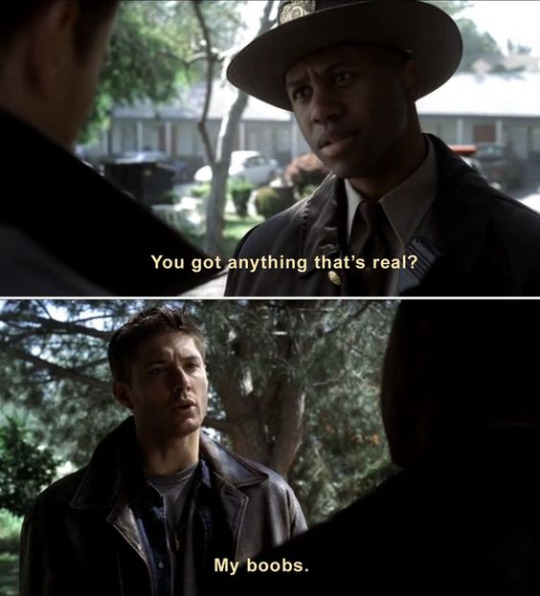
The facade Dean pulls up in season one episode 1. The fake Dean that tends to overcompensate his insecurities with bravado.
WHY this scene in particular is one that actually makes sense.
Mostly because this scene IS a if not THE root scene that cemented Dean Winchester’s starting point launching endless possibilities of character traits to be explored for seasons to come. It’s a highly impacted scene that’s very memorable, both in it’s first impressions and as a point of reference for his development.
I infer that the writers of the anime series saw this and built upon their own impressions of it. Namely, they saw this facade and thought this was the True Dean Winchester. (Which, to those who have watched past season 2, know is very far from the truth.)
So how did they write Dean Winchester?
Dean Winchester is perceived to be like a generic anime bad boy
(I say “perceived” since by all means the Supernatural anime is a reinterpretation with very deliberate changes.)
What I’m talking about are those “thug” type bullies in every school centered anime show.
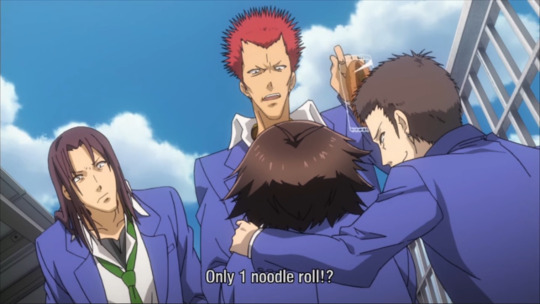
And while I make the claim that the writers may have built off of the scene from the pilot in painting a picture of Dean’s character in their heads, I’m also led to believe that this decision to have Dean come off as a “thug” is less of a conscious choice...
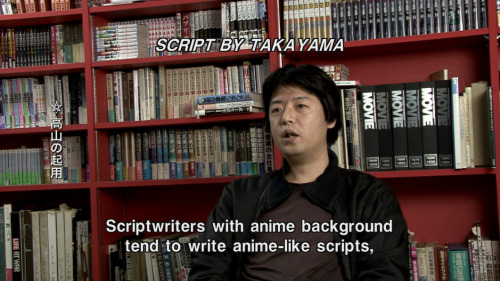
...and more of a conventional one.
Because nothing fits Fake Bravado Dean like Generic Anime Thug Dude when it comes to a script laden with anime-like tropes.
(To make a more compelling dissection of the writer’s true interpretation of Dean SPECIFICALLY would require me to rewatch and analyze ALL of the anime’s original standalone episodes.
...for the sake of brevity and the fact that I don’t want to rewatch any of the anime’s episodes in it’s entirety because I can’t stand even 5 seconds of this animated drivel I Am Not Going to Do That unless a lot of people ask about it or if people just wanna see me suffer.)
But okay, it’s sort of weird to gauge the errors of Dean’s characterization when this anime series nearly follows the original show’s 1st and 2nd season’s storylines verbatim.
Now that I think about it, it’s even weirder to be so allergic to an interpretation of a character when the source material is being 99.9% faithfully adapted--especially with the same lines and set up. So what gives?
What makes anime Dean’s characterization so off from the original to a drastic degree?
The “mischaracterization” is greatly tied into Dean’s character design and the way he emotes--which affects him greatly on the narrative of the anime series as a whole.
I already criticized the character designs in the lack of coherence in color design as well as execution narratively, but the latter still stands to be a huge major problem since it does just that.
Affect the narrative.
Which means it also affects the characters and the themes.
Which ties back again to Dean being perceived as an anime thug.
And I know this because Dean makes the same goddamn faces as an anime thug.
(In this case I’ll be referencing Space Dandy since I can’t find generic anime examples of side characters that embody this profile despite this stereotype and it’s mannerisms invading vast amounts of shows. However anyone who has seen enough anime will know what I’m talking about. And again, the “look” given by the artistic nuances/techniques of the character design of the anime series is not very original.)
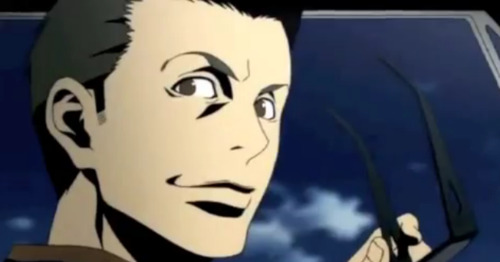
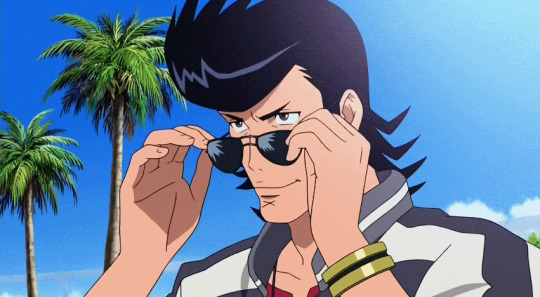
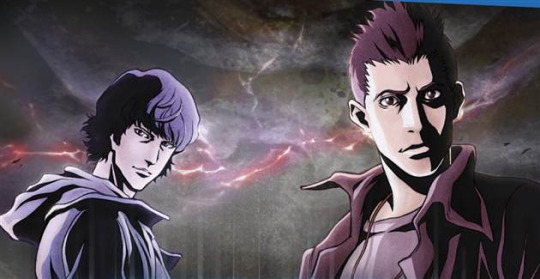
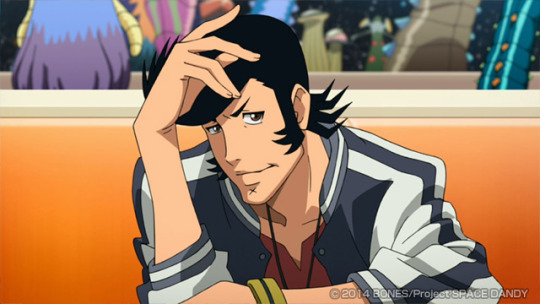
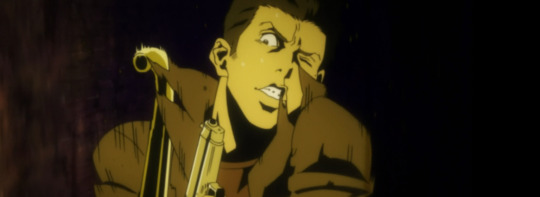
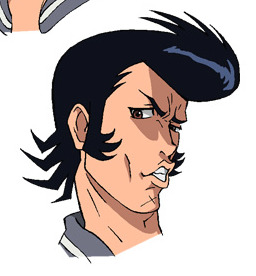
You know what, as an aside I’m just going to throw in the fact that Space Dandy’s “look” is very similar to to the spn anime down to the BL shadows in which Dandy is compared with Redline
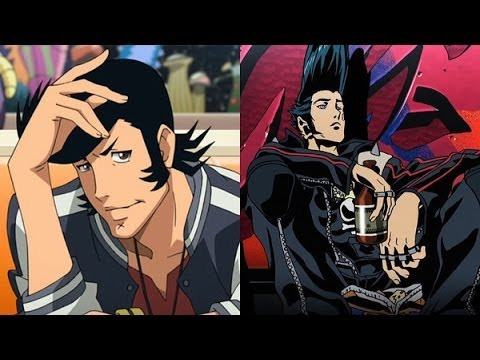
And that Jessica is totally generically designed
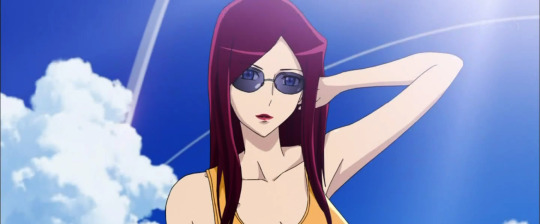
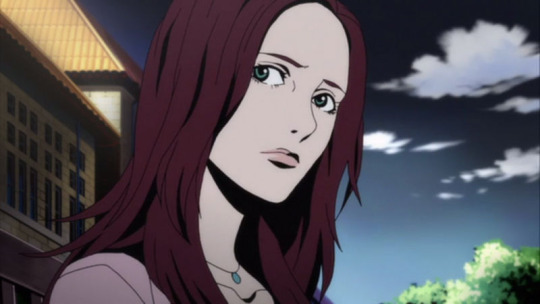
Anyway, this extends further than Dean’s facial expressions alone.
It extends to his wardrobe which totally starts to unhinge Dean’s persona. oddly enough.
So here’s a round of nit-picking
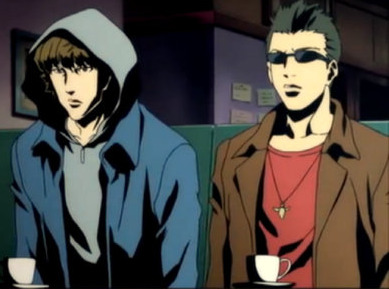
Why in god’s name is Dean wearing sunglasses indoors? He already went through an entire spiel about ineffectiveness at night
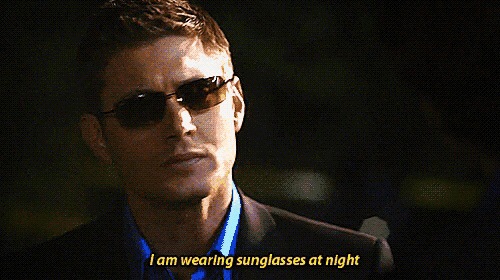
and it’s not like having it indoors makes it any less ridiculous. And yes, he does wear them again in later seasons both unironically and ironically
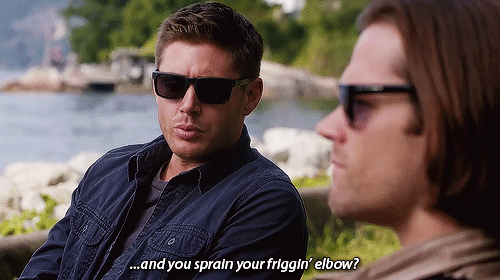
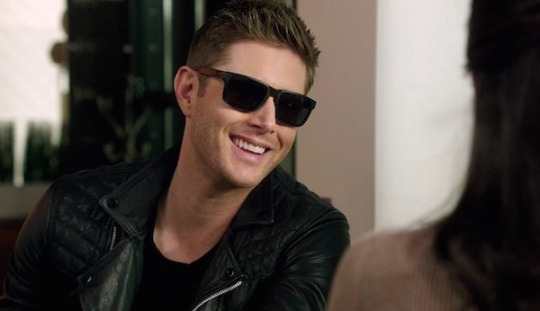
But these cues of character insight (that people have written far better meta for) is in the context of later seasons and I highly doubt the anime production team could’ve predicted any of this so I’m just going to have a giant ????? over this.
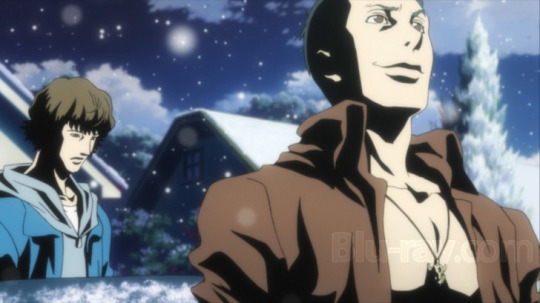
Back to this awful screenshot again.
But seriously, anyone shirtless in the snow deserves to die of hypothermia.
Dean is the last person to feel comfortable with minimal clothing due to years of sexual harassment/assault from CREATURES more often than not
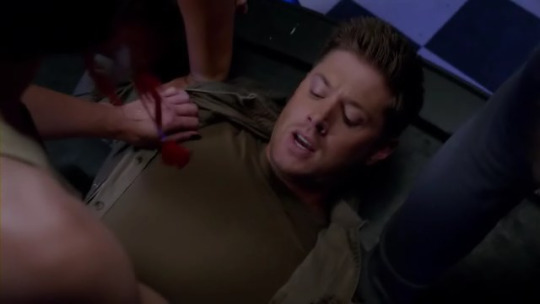
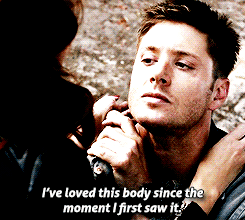
Even more so whenever Dean is naked, it’s used more for vulnerability over titillation:
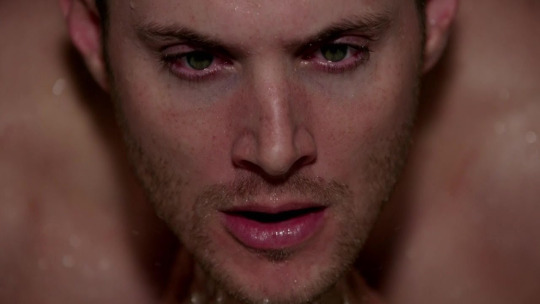
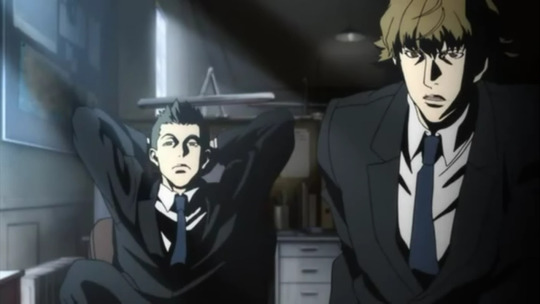
I hate this stupid screenshot.
It is awful, why? Because anime characters rarely stray from their trope mannerisms unless the story calls for it, or the animators dedicate some time to create impressive sakuga for novelty’s sake. If Dean has body language like this now, that mean’s he’s likely going to exhibit it again no matter what the context is in terms of story or character.

Leading to this abomination.
I know what you are doing. I get it. I KNOW.
I KNOW YOU’RE DRAWING DEAN THIS WAY BECAUSE APPARENTLY TO YOU DEAN IS AN ANIME THUG WHICH MEANS ANIME THUGS EXHIBIT THIS KIND OF UNCARING BODY LANGUAGE BUT NEED WE FORGET THAT DEAN LOVES HIS CAR MORE THAN LIFE ITSELF
HAVING HIS SHOES AGAINST THE SEAT OR ANYWHERE NEAR THE LEATHER IS THE SAME AS DEFECATING ON IT. ARE YOU SERIOUS RN??? THAT’S LIKE THE ONE THING DEAN WINCHESTER IS ALL ABOUT AND IS SOMETHING THAT SHOULD NOT BE FORGOTTEN ESPECIALLY WHEN IT CAME TO DEVELOPMENTS OF DEMON!DEAN
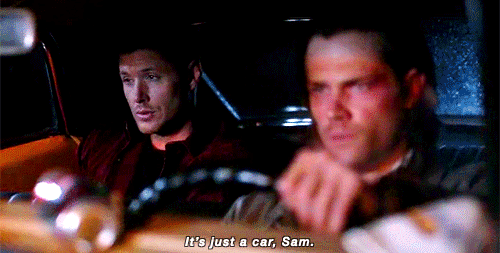
This...this shit I can’t forgive. This is so absent-minded it physically hurts me. I can’t be the only one bothered by this.
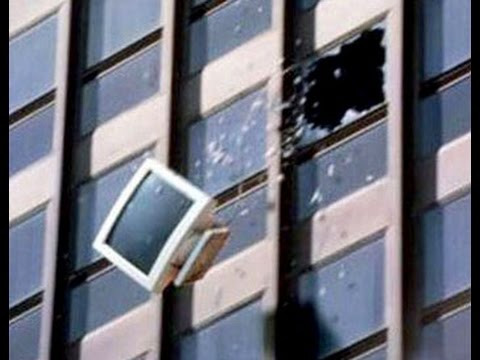
Addendum: I don’t even really care if that’s NOT the impala (in this episode of the anime Sam and Dean were thrown into the backseat of a police car.) I still don’t think Dean would EVER exhibit this sort of body language in any car.
It also still doesn’t excuse the lack of variety in Dean’s emoting and body language as a whole. You could do so much storytelling in his body language (since Jensen Ackles is a master at that) but they instead chose to stick with a template of a character and never strayed from it.
But...I digress.
Incidentally of all places Yuri!! On Ice has closer character designs of Sam and Dean that for some virulent reason exists (Also incidentally, if you so much as breathe the title of YOI you will be immediately blocked I am not joking around. Don’t test me.)
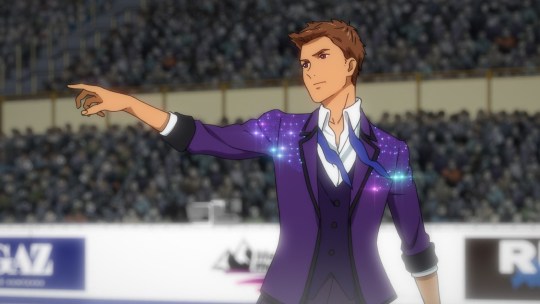
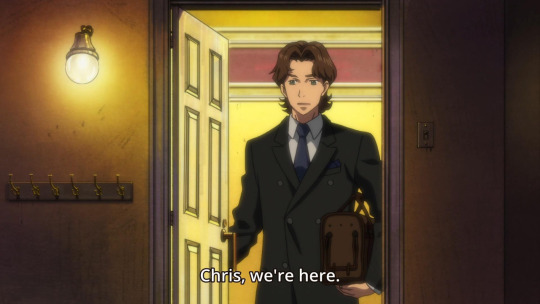
As does Yami Shibai
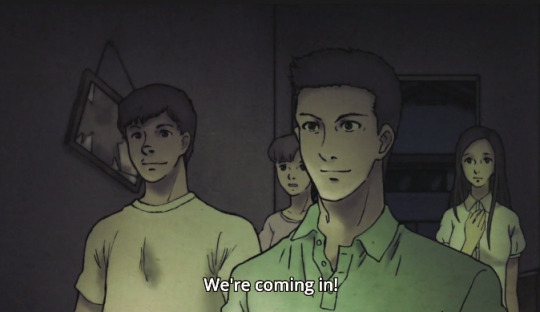
So it’s not like a competent/more modern design tailored to anime is impossible.
It is very possible. So if you have your defense that the character designs of the spn anime are inherently horrible BECAUSE it’s supposed to “look anime” you’re probably just suffering from media illiteracy.
However, again, I made claim that the “style” of the Supernatural anime character designs are not what make it fail.
It’s the execution of nuances that killed it--both visually and narratively. And I still stand by that.
To form examples, that means more design redraws!!!
However, the redraws this time around will have it’s own separate post since the inner working of what can make or break a design will be discussed and demonstrated there.
SEE YOU IN PART 2!!!
57 notes
·
View notes